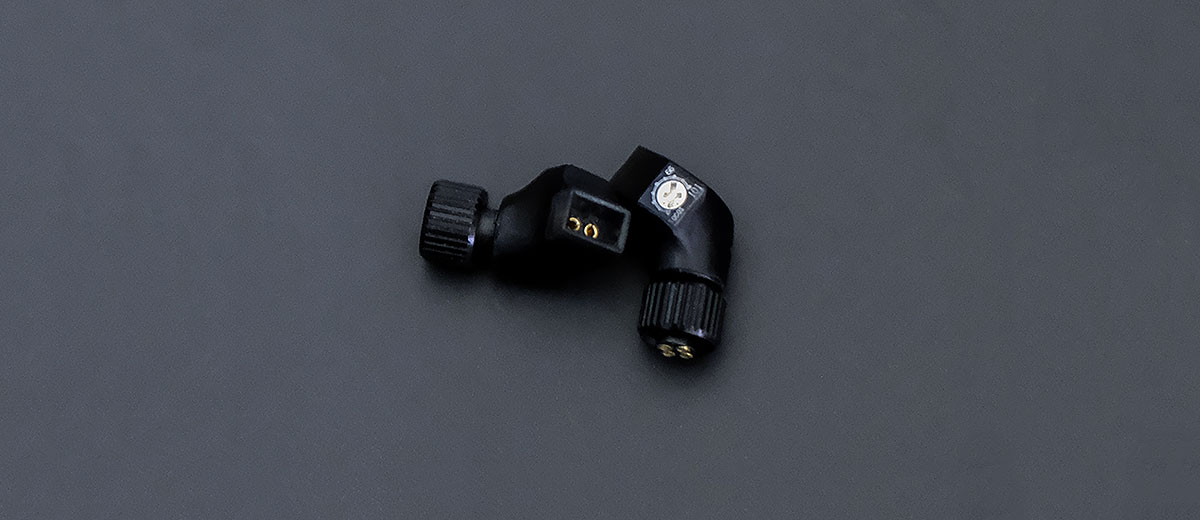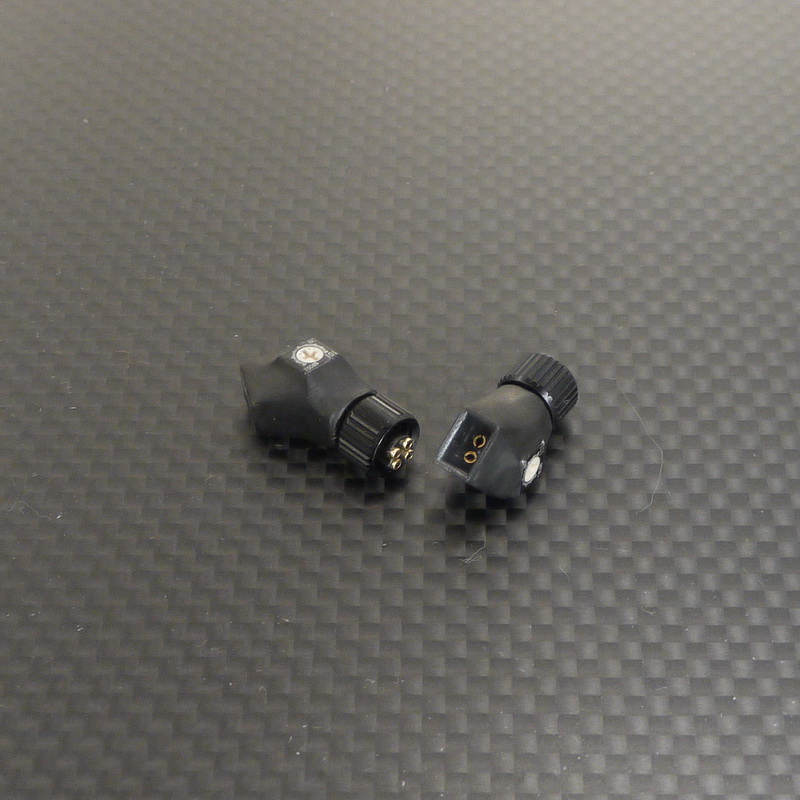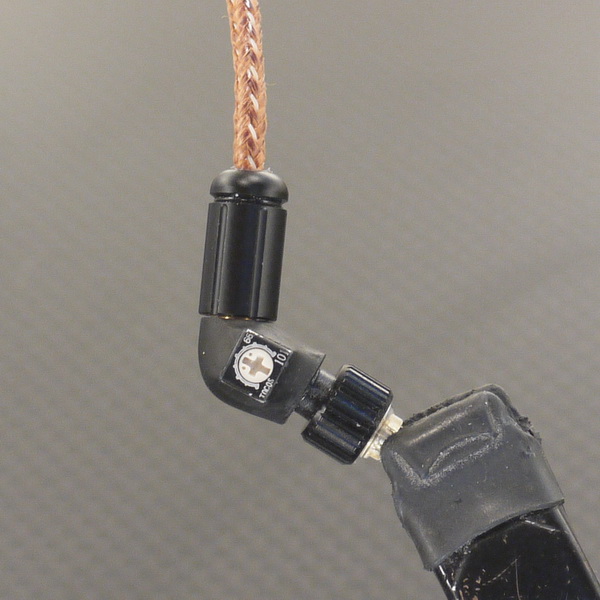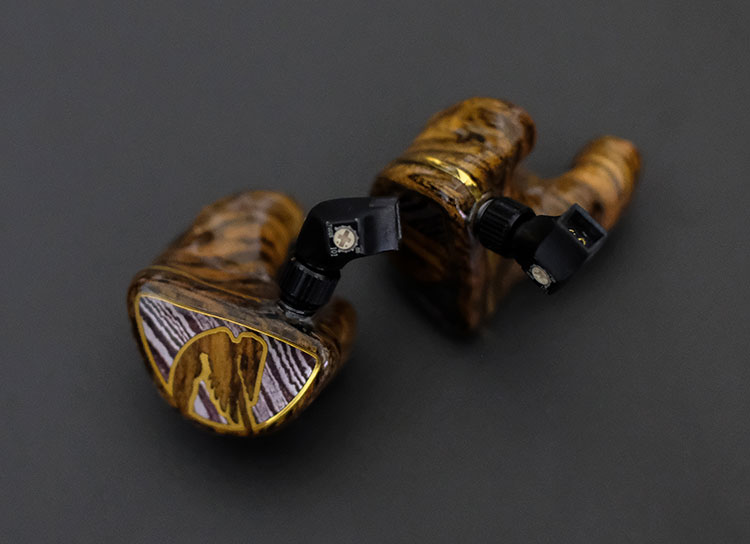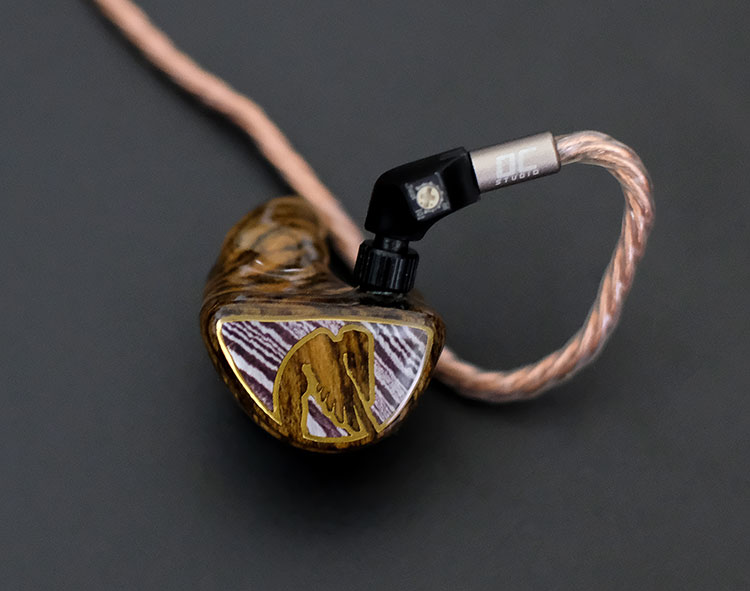The E4UA JH Audio Variable Bass Pod adapters is a unique product that allows you to use any cable with bass adjustment on JH Audio IEMs. It is priced at around $250.
Disclaimer: The E4UA JH Audio Variable Bass Pod Adapters sent to us for the purposes of this review were paid for by us with a small measure of discount in exchange for posting our honest impressions here.
Thank you to Masao-san for providing an excellent service from start to finish.
Note, this review follows our new scoring guidelines for 2020 which you can read up on here.
On May 23rd, 2018 I posted our review of the JH Audio Layla, and to be frank the complete package blew me away. So much so it grabbed the top overall score for 2018 for a custom IEM. The only thing that nagged at the back of my mind was the supplied cable.
Cable Concerns
Proprietary Connectors
There are a number of reasons for that. First, I always had a sneaking suspicion that the stock cable of the Layla could be a bottleneck in getting the most out of its performance. Having no alternative JH Audio terminated cables my only option is to get the Moon Audio Dragon Silver cable if I want to upgrade right away. Not a wholly satisfactory conclusion for someone who has plenty of existing aftermarket cables laying around in 2-pin and MMCX format. Cables I know well and enjoy.
Variable Bass Pod
The second concern is the Variable Bass Pod that is in-line on the stock cable. I could easily grab a cheaper connection converter from Effect Audio or one of the other reputable cable makers but it would mean losing the ability to fine-tune the low-end without the use of the Bass Pod.
The E4UA Solution
Step forward Masao Kamikodai and E4UA of Japan with a far more nuanced solution to my needs, a converter WITH the Variable Bass Pod adapter built right into it. Needless to say, I was all over this like bees to honey.
Basically, this is a JH Audio 4-pin connection female to a 2-pin female converter (or MMCX, there are other options) with a miniaturized bass attenuator right in the middle. They come as a pair, one for each channel (left and right) and each unit has its own attenuator module built-in. So, just like the stock cable, you can adjust the level of bass in almost the exact same manner.
Price
The price for 2 units is not cheap. They will cost around $250 including shipping to your door. Much of the cost is due to the fact they are more or less hand built by Masao-san himself as well as the semi-fixed resistor module for the bass attenuator.
If you are pairing with a $3000 Layla and you want to make use of some good quality aftermarket cable, on the other hand, I think the price point is acceptable for the qualitative difference it makes to the performance.
Build
The build quality is tight, well made for DIY and also fairly light. The contouring is pro level in terms of smoothness and consistency on both modules. The entire length is about 1.5cm and beyond the initial screw-in 4-pin connector it bends at a 60-degree angle.
This is important because the adapter itself will add considerable length to the connection. It needs to be angled in such a way as to avoid pressure and discomfort on the ear as well as ensure that any connecting cable continues to go over the ear in an easy manner.
The 2-pin female connector is actually recessed in a plastic guard but should work with almost all 2-pin male terminations. There is a slight bump or ridge down one side to help you get the polarity alignment correct when inserting your own cable of choice. The recessed plastic guard, in turn, strengthens the entire connection so it feels well protected and unlikely to bend or break the pins.
Variable Bass Pod Positioning
The Bass Pod screw is slightly raised in the main housing and facing outwards for easy access. You adjust it in the same way you adjust the JH stock cable module through the use of a small screwdriver. The Pod has similar settings with four markers in each corner reminiscent of the older screw-dial of the Roxanne V1 era pod.
I say easy access but really this is one of the drawbacks of having the pods right up beside your ear. On the JH Audio stock cable, you can fine-tune the level of low-end attenuation whilst still wearing your Layla or any other 4-pin JH Audio creation. The position far down the wire makes it easy to see what you are doing.
Line Of Sight
Not so with the E4UA adapters. You need to tweak the setting with them out of your ear to be sure both have the exact same level of attenuation. This can be slightly tiresome and of course, you are not 100% sure if the final setting is just right for you until you put the IEM back in your ear.
You will still need the little JH Audio screwdriver to adjust the screw also on the adapter to control the bass. Well, to be honest, any similarly sized screwdriver will work but if you happen to already have the JH supplied one then great.
Adjusting During Use
I did try using the screw whilst they are in my ear. Initially, it does take a bit of practice but the more you try the more accurate you feel you can be. Of course, there are two positions which you will always nail when in your ear, the least and most amount of attenuation.
In other words, twist the screw until it can go no further and twist it back again to the original starting point. Anything in between? Well, I do think you have to take out the IEMs and just fine tune each side so they are matching.
Performance
I would call this performance rather than any sound impressions because we are focused on two aspects the level of bass attenuation compared to the stock cable Bass Pod and how well it works with the Layla using some alternative cables. This is not a cable performance review so we will not be going in-depth on how the Layla sounds with other cables, just some light impressions.
Bass Attenuation
The stock Variable Bass Pod is measured at a 13dB boost between the lowest point and the highest point on the dial. It targets the 60Hz point in the FR of the Layla but also tweaks the rest of the curve by around 2-4dB depending on the amount of boosting you want to throw in.
The 60Hz elevation starts with around 6dB up to 12 noon on the dial, add in another 2-3dB on top of that for the 2pm position and then a final 4-5dB once you hit 4pm or the highest point of the boost.
It can be a touch tricky making a like for like comparison of the two attenuators dB boosting potential simply because you need cables that are the exact same to be 100% sure. However, going back and forth my ear is telling me that the E4UA modules are not quite as extreme sounding in their boosting at the various points.
At their lowest level, they do seem to be broadly similar in their lack of 60Hz boost and any other minor FR change-ups beyond that. However, by the time both are moved up to 4pm on the dials, the JH Audio Variable Bass Pod boost dB seems to be a bit higher or more extreme.
Cable Rolling
The cable change is where the most dramatic effect occurs on the Layla using the E4UA adapters. It also confirms my suspicion that the stock cable has a very high level of resistance which reduces the level of dynamic range on the Layla’s performance as well as the staging capability.
4-Wire
With a good quality 4-wire around 26AWG, such as Effect Audio’s Lionheart or the slightly cleaner sounding Thor II, the Layla really opens up over the stock cable sounding much more open with far better treble articulation or perceived top-end clarity. Simply put both cables makes the stock sound more compressed and much woolier in its presentation.
However, 4-wire solutions such as the Lionheart only conveyed a moderate level of bass boosting or attenuation using the build in E4UA module adjuster. To really get the full potential of both the Layla and the E4UA’s adapters I highly recommend moving to an 8-wire aftermarket cable with a gauge rating of 22AWg to a min of 26AWG, the less resistance the better.
8-Wire (Higher AWG)
Cables such as the Ares II 8-wire (26AWG) custom build ($300) and the OC Studio 8-wire Orpheus MK5 ($150) are two affordable options that perform very well indeed with the Layla though with quite different sound signatures.
The Ares II 8-wire custom build retains a fairly neutral balance for a copper cable but with excellent dynamic range and a much fuller sound than the stock cable. The Orpheus MK5 is full on copper with a rich full-bodied and slightly darker tone. The key difference between these two paired to the Layla is the weight of the low-end. The Orpheus hits much harder and sounds the denser of the two. It is not quite as detailed sounding but certainly more striking.
The slightly higher 24AWG for me also makes a bit of a difference with the attenuation module. The effect is a little more noticeable in terms of bass boosting at the extreme end (4pm) over the Ares II 8-wire 26AWG. Not that you won’t hear a difference on the Ares II but rather the Orpheus conveys it better.
Our Verdict
The E4UA JH Audio adapter with variable bass attenuator module is unique and dare I say it almost essential for anyone using a Layla and wanting more than the stock cable. You can go cheap with a bunch of JH Audio 4-pin terminations on your cable but it is that bass attenuation module that marks out the E4UA creation from just about anything else on the market.
The level of bass boosting does feel a little more controlled than the JH Audio stock module, perhaps not as much dB boost. It is hard to really nail that without measurements because a new cable brings all sorts of tonal changeups that could mask the boosting effect more. I did note though that 8-wire high gauge cables brought out the most in terms of bass boosting and dynamic range.
At $250 for a pair you also need to first analyze your cable collection and see if it makes sense. You can upgrade to the Moon Audio terminated SIlver Dragon alternative or JH Audio’s own 2.5mm balanced version but either to me is not satisfactory.
You will get a better sound, a more open presentation with the Silver Dragon but you lose the Variable Bass Pod. The stock cable, even balanced, has none of the clarity and dynamic range even modestly priced aftermarket cables have but it does have the bass module.
This is where the E4UA solution makes so much more sense. It really opens up the Layla (or any other 4-pin JH Audio IEM) to almost any cable combination you want to throw at it, be it balanced, single-ended, copper, silver. At the same time, it offers you that unique bass attenuation capability. Genius ideas like this are so hard to come by these days.

